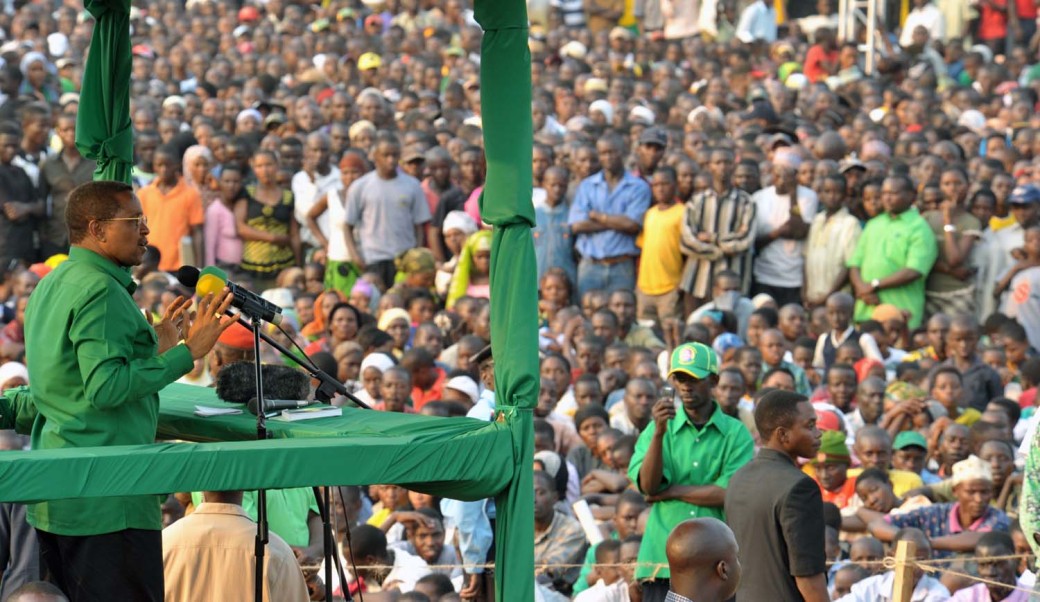A lot of the chatter among the political class recently has focused on CCM’s refusal to take part in any public debates during this general election campaign. In The Citizen on Sunday this past weekend, Evarist Kagaruki writes:
CCM’s rejection of these debates calls into question its democratic credentials. The ignominious move by the party’s Secretary General Yusuf Makamba to bar all the party’s parliamentary candidates form taking part in the debates organised by the state broadcaster TBC1 (see Mwananchi of September 9, 2010) leaves a lot to be desired. It brings to the fore the grim fact that the grand party has not shed off some its old habits…reminiscent of those infamous rigid controls of the one-party dictatorship.’
Elsewhere, The Mikocheni Reporter is even more unsparing in her analysis:
It may be that this decision is based on CCM’s belief that it will win no matter what, that the opposition poses a negligible threat, and that voters are content to elect a party that does not respect their intellect. The implicit message is that CCM don’t have to work for our vote, they just assume we’ll give it to them. What a brave notion. Alternatively, the gag order is an act of sheer desperation. Maybe the Party believes that it will be used to mop the floor clean if it engages with the opposition and with voters in policy debates. If that’s the case, I would have to encourage the Party to gird its loins. Better prove to be a fool in public than give off the pungent odor of political cowardice.
While I agree with both Mr. Kagaruki and TMR on the larger point, the nontransparent nature of this approach, I am nevertheless going to offer an alternative perspective on what is happening here. I think it is very naive to believe that political parties anywhere think of elections in democratic terms. Yes, they may wax lyrical about the principles of openness and transparency but fundamentally they all want to win. Viewed in that context, CCM’s decision has nothing to do with them being undemocratic. Rather it is an act of political calculation that they believe will guarantee them a huge victory in October. And I am going to say something that goes against every bit of the new established orthodoxy: I think it is a brilliant piece of public relations strategy.
Let me explain why I believe that.
One of the most difficult things to do during political campaigns is to, first, establish a clear and coherent narrative about your agenda and second, to go out there and consistently articulate that narrative. All sorts of things can happen to throw you off course. From pesky reporters asking uncomfortable questions you want to avoid to opponents trying to score cheap political points off you, all this can unsettle a campaign’s imperative to control its message. And therein lies the the point: by foregoing the debates, CCM is essentially able to control what it says. Furthermore, President Kikwete is already the front-runner incumbent. Why should he elevate the stature of his opponents by engaging with them? (Ditto CCM parliamentary candidates). The power of incumbency allows him to command huge audiences at campaign rallies where he is able to talk to the electorate directly and on his own terms without the interruption and noise of his opponents. Up until now, he has risen above their ranting and raving (and if you’ve been watching any of the TBC1 parliamentary debates, this is exactly what has been happening) while projecting the gravitas of a President in complete control of his message. You can criticize this approach’s supposedly undemocratic connotation. But it is simplistic to suggest that it is borne out of incompetence or political cowardice. It is a strategy that is rooted in the desire to win.
(Photo: President Jakaya Kikwete speaking at a campaign rally in Kagera in August, 2010. By JakayaKikwete2010)

Great rebuttal Shurufu!
I still don’t see the brilliance of CCM’s action. Democratic debate has nothing to do with it. Simply put, it is bad image management for the Party to leave such a tangible gap in the campaign media scene. I still maintain that it is a mistake on the part of the Party, and not a deliberate PR coup as you suggest.
Ummm.. yeah…I agree with Elsie, as in this is definitely not a PR stunt what so ever, unlike their futile social media approach, however what your rebuttal is…..spin doctoring. = ) (Now there’s the PR you speak off)
Public debate is the lifeblood of the celebrated ‘liberal democracy’ that we are pretending to emulate from I don’t know where! I don’t have a big problem with the incumbent’s ‘strategic’ decision not to engage the seasoned public debaters – Professor Ibrahim Lipumba and Doctor Wilbrod Slaa – in a public debate in front of so many citizens for indeed even villages have venues showing TV programs publicly (Remember how we watched the fall of a Prime Minister live in the Parliament!) Surely the incumbent is not a Barack Obama so it is understandable regardless of whether one dubs it a ‘PR’ , some sort of chickening out or an exercise in saving oneself from public embarrasment. What has really annoyed me is to stop other candidates, including those who are very able – the likes of January Makamba and Doctor Harrison Mwakyembe – from engaging in such debates! It has starved the populace of what would have been the debates of a lifetime – just imagine a brilliant candidate from ‘the party’ engaging the likes of Tundu Lissu!
Pingback: Global Voices in English » Tanzania: The Use of Social Media in Tanzania General Election 2010
Pingback: Global Voices in English » Tanzania: CCM and Political Debates
Pingback: Global Voices in Swahili » Tanzania: Matumizi ya Vyombo vya Habari vya Kijamii kuelekea Uchaguzi Mkuu wa 2010 Nchini Tanzania